This is a response to a request I got from @SecretPro for some information about a friend whose grandfather played for Leicester just after World War 2 - a player called Bobbie Anderson. I was going to send a photo and a bit of background information, but as is so often the case, once you start looking into something, you find yourself tumbling down the rabbit hole and finding out all kinds of fascinating stuff. @SouthStandUpperTier, @davieG and @Rain King provided some useful info and a photo yesterday, but I thought I'd give this a thread all of its own as it really needs it to tell the story in full.
June 1944
Leicester manager Tom Bromilow knew he had to start planning for the end of the War, which everyone was praying would come sooner rather than later. Unlike the first War, the club had not lost players in the fighting, but it had suffered massively in other ways. A German bomb had damaged the main stand (and German POWs had helped repair it). A fire had then completely ruined half of that stand and all the equipment inside, damage that the club couldn't afford to repair (and wouldn't have been allowed to anyway, with post-war resource shortages). The City Council then told them they may have to leave Filbert Street, with the land needed by the Electricity Board. And most of the club's directors had been banned for life after under-the-counter payments had been exposed. It was truly a dark hour.
But Tom Bromilow knew he just had to get on with the job. He liked nothing better than getting on a train and heading for some far-off destination to seek out new talent.
In June 1944, he went north, first to Glasgow, and then on his way back, to Middlesbrough. In Scotland he visited a club called Mearns Amateurs, and spotted a 15 year-old winger called Robert Anderson. In Middlesbrough, he saw our new nursery club Middlesbrough Swifts in action, and it was 16 year-old Donald Revie who caught his eye.
Don, as he was known, and Bobbie (or sometimes 'Bobby'), as he was known, soon headed for trials at Filbert Street, and both impressed.
Years later, Revie wrote about the moments after he first stepped off the train at Leicester Station: I wandered forlornly around Leicester with my football boots wrapped in brown paper under my arm. I walked round and round the shops, then hastily gulped down a cup of tea in a small café’. He was soon in action, wearing a City shirt for the first time in a 2-2 draw v Wolves at Filbert Street, the first game of the 1944/45 season, which was still organized into regional Leagues.
Bobbie Anderson's arrival in the city may have been very similar, but in his case, the chance to play for Leicester would have to wait. He was an apprentice fitter-engineer, and it wasn't until January 1945 that he was fixed up with a company in Leicester where he could continue the apprenticeship.
1945/46
With the war over, football could get back to normal again. Though not immediately. The Football League decided that 1945/46 would be a transition season, still based on regional divisions.
Leicester City had a new manager. Tom Bromilow had quit in March, and Tom Mather had just taken over. It can be unsettling when the man responsible for bringing you to a club suddenly moves on, but Mather knew a thing or two about wingers. When he was Stoke CIty manager in the early 1930s he had signed 15 year-old Stanley Matthews.
On Saturday August 11th, Bobbie turned 17, and on that day Leicester City held their first post-war trial match, 'Blues v Whites', to see who would start the game at home to Charlton Athletic, scheduled for two weeks later. Bobbie and Don played in the trial, but only Don was selected for that first game, which Charlton won 3-2. The return match at The Valley a week later was also lost.
Wondering who could freshen things up, Tom Mather went to watch Leicester Colts (the youth team) on Wednesday September 5th, with Bobbie in the line-up against Ibstock Penistone Rovers. He must have impressed Mather as the next day, the boss told him to join the first team squad for their third game of the season, away at Brentford.
He was supposedly just along for the experience, but then left winger Fred Crack of Grimsby Town, due to turn out for us as a guest, was suddenly called back to his army base in Germany - which meant Bobbie Anderson's big moment had arrived.
To call his first team debut 'sensational' would not be an exaggeration. This was the how the Daily News, then one of the leading national newspapers, reported the game:
The Leicester Evening Mail called him a 'boy star', and said his teammates 'mobbed' him when he set up that first goal.
Here's the Middlesex Chronicle, with an entertaining passage I'll quote at length:
It was one of those affairs when one team exerts four-fifths of the pressure and the other lot snatch the goals. When Leicester full back Dai Jones, as a sort of advanced goalpost (and with no more intention than if he had indeed been one of those inanimate pillars) turned away a terrific smash by Les Smith, I thought it was going to be one of those days. That was a mere four minutes from the start, but the premonition was soon justified. When Leicester won a corner, the ball was most meticulously middled by Bobbie Anderson, and it was met by the head of Liddle to send it curling on a 12 yard journey into the net. It was 2-0 at the interval and in the second half the ball stayed in the City half for such long periods that the Bees might have been kicking down a one-in-three slope.
A week later, that reporter was still writing about the same game:
Many a young player has been ruined by too much fulsome praise, and we had an instance last week when Anderson, making his debut after a Colts' appearance the previous evening, was hailed by one writer, with the imagination of a film star's press agent, as Scotland's next Alan Morton. He made a most promising debut, but to start measuring him up for an international cap on the basis of one appearance is verging on the ridiculous. Let's hope the lad takes no notice.
On the opposite wing that day was Don Revie, and supplying them both from the middle of the park was City legend Sep Smith, then in his 17th year at Filbert Street.
Tom Mather certainly wasn't going to let the attention go to Bobbie's head. He chose him for just a handful of games that season, unlike Don Revie, who was becoming a regular, playing in the club's first FA Cup game for seven years, a third round defeat against Chelsea.
1946/47
The transition was over, and the Football League was finally back to normal. We had yet another new boss - Johnny Duncan, the wizard of Leicester's forward line in the 1920s who had since been running the Turk's Head pub, opposite the prison.
Just like the previous season, we lost our first two games without Bobbie, then he came in for game three. In the record books, this is considered his 'real' Leicester City debut - the transitional season deemed 'unofficial'. Could he have the same impact as at Brentford? Once again, it was a tough-looking away game in London - at Upton Park. And once again, he was sensational.
This was the Leicester Evening Mail:
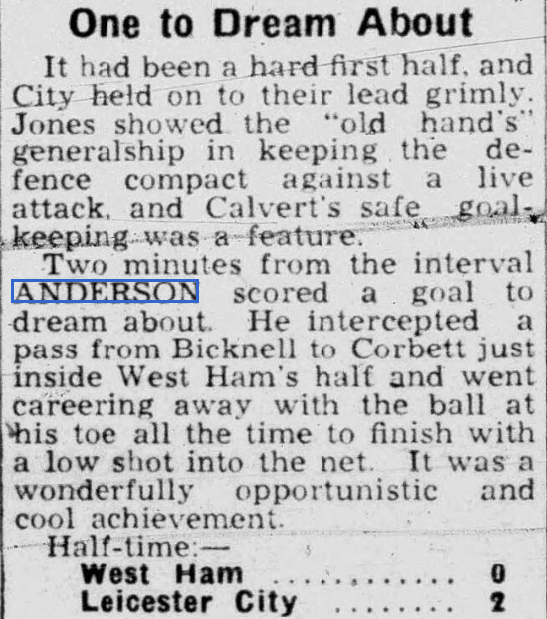
The same reporter added: Opportunities for Leicester became fewer later on, but the 17 year-old Scot with the twinkling feet and quick-thinking brain, never ceased to be a problem to the West Ham defence. 2-0 was the final score.
Once again, though, this was only a brief flash of Bobbie's talent. He played a total of 13 games that season, without adding to his goal tally. Meanwhile, Don Revie was continuing to establish his reputation.
1947/48
A season of frustration for Bobbie (who made only six appearances, scoring once against Millwall) and for Revie, out for six months with a broken ankle that was so bad that doctors were almost certain he'd never play again.
One bright spot for Bobbie came in a reserve game against Spurs:
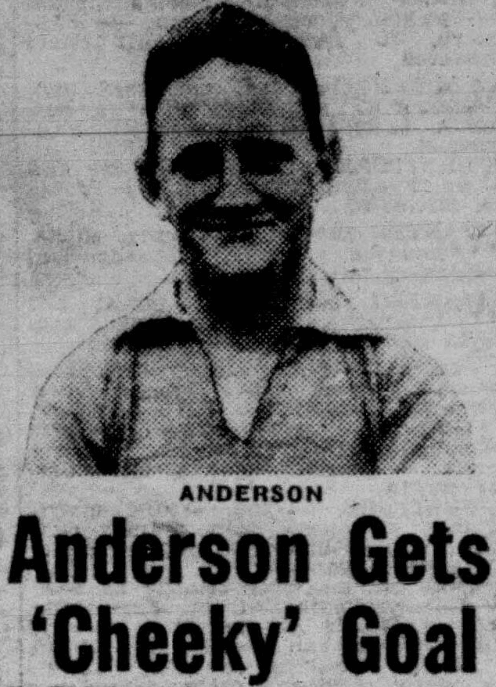
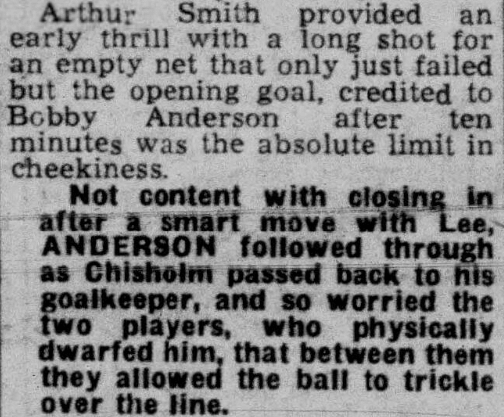
1948/49
In the four years since Tom Bromilow's scouting trip brought them to Filbert Street, the careers of Bobbie and Don had gradually diverged. Revie had now made a miraculous recovery from his injury, and was an indispensable member of the City side that mounted a historic bid for the FA Cup this season, despite struggling at the wrong end of the Second Division. Bobbie's lot was very different. With the quarter-final approaching, he had not made a single first team appearance all season. But then suddenly he sensed an opportunity.
That quarter-final was at a venue which held special memories for him - Griffin Park, Brentford. In the days leading up to the game, regular left winger Charlie Adam was struggling to be fit, and there was speculation in the press about who would replace him - Bobbie Anderson, or Jim Dawson (Bobbie's best mate).
On the Friday morning, Adam passed a fitness test, but then just as it seemed Leicester would be able to field their regular forward line, Adam was handed a telegram from Scotland with dramatic news. His mother had been rushed to hospital and was 'dangerously ill'. The club were prepared to let him travel north, and it seemed that a replacement would be needed after all.
But Adam insisted on playing, and he stayed with the Leicester squad.
His mother died that night, and on Saturday, Adam lined up alongside Revie as City tried to reach the semi-finals for only the second time. Bobbie Anderson wasn't needed.
This is what happened:
Adam left for Scotland immediately after the final whistle.
In the semi-final we shocked First Division leaders Portsmouth at Highbury (arguably our greatest ever result in the competition) - and so we had finally made it to Wembley.
Don Revie then suffered a freak injury against West Ham, and this time it was not just his career but his life that was in danger. He had punctured a vein at the back of his nose, and he needed a series of blood transfusions at the Royal Infirmary to take him out of danger. There was no way he'd be ready for the Cup Final.
As that was confirmed, just three days before the final, there was a milestone moment at Filbert Street - Sep Smith's last ever appearance on the ground, for the reserves against Bournemouth. Also playing that day was Bobbie Anderson, and it was his run from midfield that led to City being awarded a penalty, from which Sep Smith scored. He didn't know it then, but that was also Bobbie's last game at Filbert Street.
Three days later, he was at Wembley to watch us lose heroically to Wolves, 3-1, while Don Revie was listening to radio commentary in his bed at the Infirmary.
In the week following the Final, the local press had good and bad news about Bobbie. On Wednesday came reports that he was one of eight players placed on the transfer list. He was no longer wanted at Filbert Street. But somebody wanted him. The following day came news of Bobbie's engagement. The big day would be June 25th, and this was his bride-to-be:
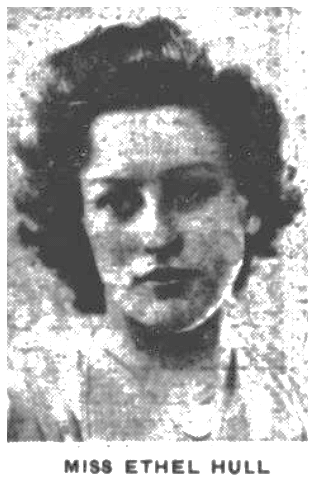
Here's Leicester Chronicle from July 2nd reporting on the wedding:
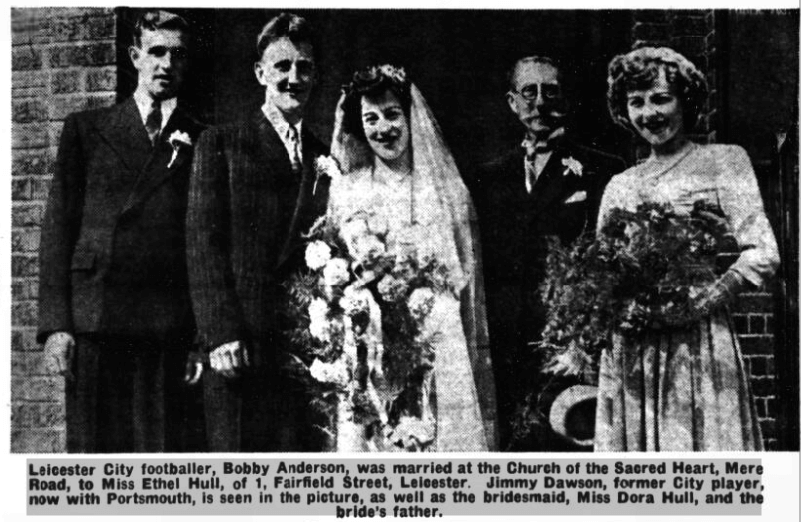
Don Revie was planning his wedding too - his bride Elsie was the niece of Leicester boss Johnny Duncan. When another City player, Jimmy Harrison, married Doreen Shipman, daughter of the club chairman Len, he had been barracked by City fans, who suspected he was getting favourable treatment. Don didn't want to suffer the same fate, and told the club he wanted a transfer.
In November 1949 he got his wish, with a move to Hull, though by then Duncan had moved on himself.
So the Leicester careers of Don Revie and Bobbie Anderson overlapped almost exactly - arriving in summer 1944 and leaving early in the 1949/ 50 season.
Revie went on to enjoy great success as player and manager, and to have numerous books and documentaries devoted to describing every moment of his life.
Bobbie Anderson was almost completely forgotten, but as you can see from that post-war period in which he shone briefly yet brightly, his story is well worth telling.


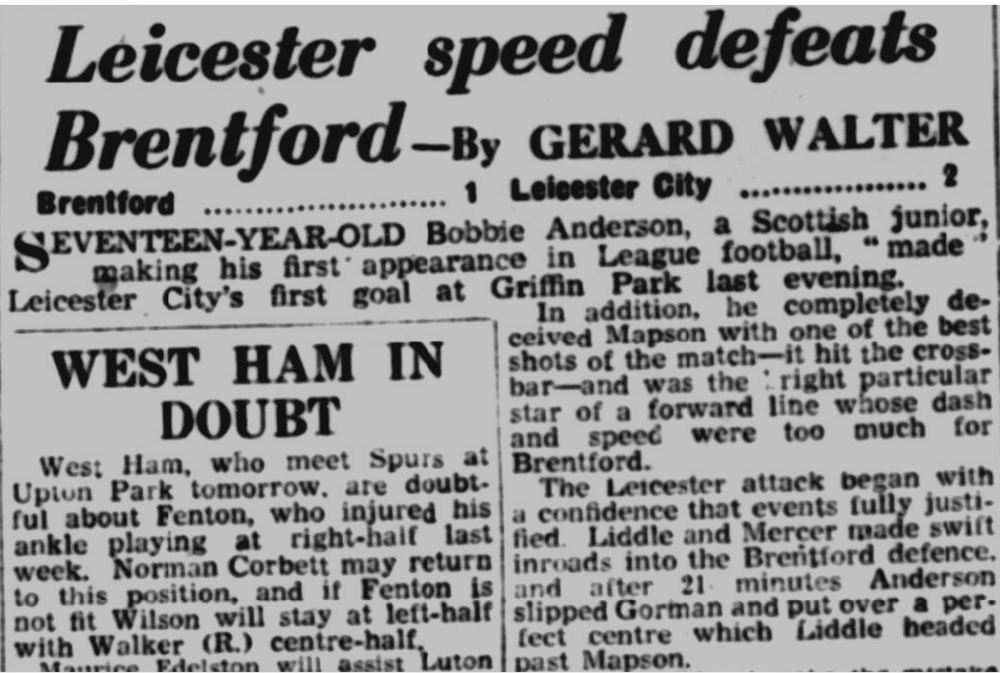
Recommended Comments
Join the conversation
You can post now and register later. If you have an account, sign in now to post with your account.
Note: Your post will require moderator approval before it will be visible.